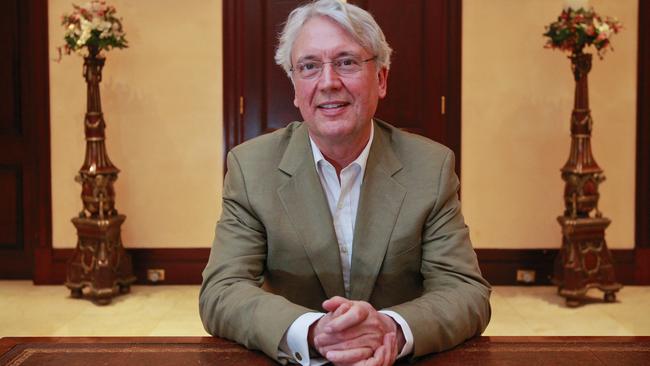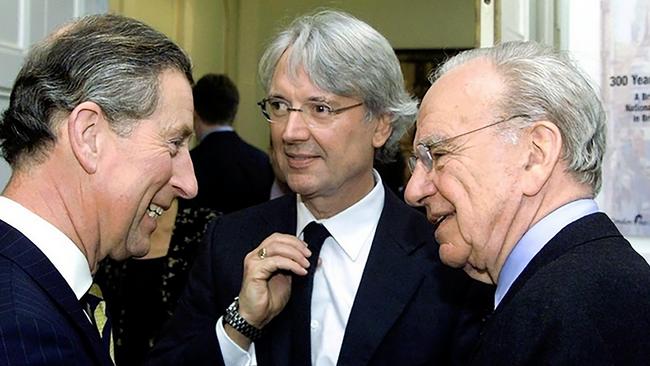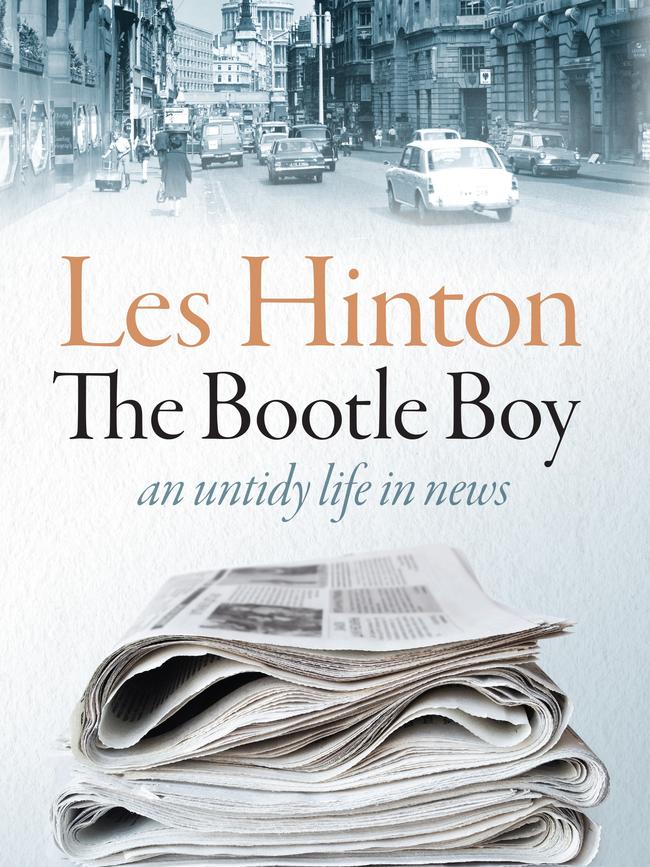Les Hinton on newspapers, Rupert Murdoch, life in Fleet Street
For 52 years on Fleet Street it was hard to tell if news followed Les Hinton, or he followed news | PODCAST

Les Hinton worked in newspapers for Rupert Murdoch for 52 years but is frank about their future.
“I don’t think that newspapers can ever be the great giants of profit that they used to be,” says Hinton. “There are too many people telling the same stories.”
In the 19th century, newspapers were manufacturing and distribution businesses operating in a pyramid structure, with a tiny number of enterprises expending massive capital outlay on presses, trucks, newsprint, ink, distributing news to the masses.
“What’s happened now is the pyramids upside down and you’re sitting there like you have infinity in the palm of your hands. Nothing that a newspaper in the traditional sense does can possibly beat that.”
Hinton is 74 years old and spent 52 years working for Rupert Murdoch, the executive chairman of News Corp, publisher of The Australian and head of a global media empire.
He ran the UK newspaper division, News International, then Dow Jones, owner of the Wall Street Journal, before leaving the company in 2011 because, he says, the notorious News of the World phone hacking scandal happened on his watch, but he had no knowledge of it.
Hinton’s life proves that journalism is the rough draft of history. As he recounts in his memoir, The Bootle Boy, despite his poor working class background, he was introduced to Bill Clinton at a function at Number 10, home of the British Prime Minister, and found to his bemusement mid conversation that the leader of the free world was leaning on him.
When he took over the running of The Times papers and The Sun and News of the World in the mid-1990s, Princess Diana phoned him up to tell him during his first weeks “I am a damsel in distress.”
“Fleet Street wasn’t responsible for her death but they did lay siege to her life,” Hinton tells The Australian’s Behind the Media podcast.
And when he worked for Fox TV in Los Angeles, his neighbour was OJ Simpson, the star footballer and actor at the centre of one of the most notorious murders in modern media history.
It is hard to tell if news followed Hinton around, or he followed the news. Decades earlier in 1970s New York, when Hinton was a correspondent for The Sun, passed out after a night out with punk rocker Johnny Rotten, who then draped him with blow-up sex dolls and took photos.
And Hinton was on the scene at the Chelsea hotel when Sid Vicious’s girlfriend Nancy Spungen was found dead. Hinton broke the story in The Sun, to the fury of rival Daily Express correspondent Paul Dacre, who rose to be the most powerful newspaper editor in Britain.
Now he is on a book tour of Australian, and the ABC have called him in for about 12 interviews.

“It’s very pleasing but I don’t kid myself that the main interest in this country in particular is that because of the presence in my story of Rupert Murdoch. One writer rather cruelly but not untruly said that I appeared to be ‘the supporting act in my own life story’.
“I hesitated about writing my life story at all because I knew I was going to have to deal with Rupert, because Rupert is so maligned by most of the books that are written about him.
“I wanted to try and do something that was neither a sycophantic defence of him because the fact is he is let’s say at the least not a perfect human being. But I didn’t want to join the chorus of a sort of excessive I think misunderstood criticism that he faces.”
Anecdotes about Murdoch abound but Hinton doesn’t mention him until chapter five, concentrating on his own life story.
“There’s a lot of criticism of him and a lot of criticism of him is warranted. He is tough. He is ruthless. His best friend is the business and I think probably his principal loyalty in life has been to the business and his family. And so in serving those loyalties he’s made a lot of enemies and to be honest he’s earned a lot of them too.”
But Hinton points out there is a “streak of kindness” in his old boss, “a decent guy with the same frailties that everyone else has got. But he was just very determined to succeed and that came at a cost.
“He is as I say in the book he is an authentic Colossus for all his flaws for all his warts. He’s made an incredible impact and given people more choice and his newspapers are criticised most of all for being partisan as well as for being tabloids.”
Born in the very working class suburb of Bootle, he spend his formative teenage years in Adelaide, where he entered journalism working for the Adelaide News, before moving to Fleet Street and ultimately running News Corp’s US tabloids, TV interests, UK newspapers and then Dow Jones.
He agrees that tabloid journalism is muckraking, hypersexual and invades people’s privacy. “It’s all those things and it’s not a particularly new phenomenon and if you go back to Victorian pamphlets or the penny dreadfuls of the late 19th century you would find even more of the material that you’ve described.

“The fact is it’s also very popular. It’s also very entertaining as well as doing those things you describe it is very informative it manages with great skill importantly I think to combine serious news, informative news written for the masses in a way that can be understood and it also entertains them.
Much of the social media agenda, obsession with body image, scabrous online fights, campaigning, is the tabloid agenda.
“So which came first? “ he asks. “Did they learn it from the tabloids? I don’t think so. I mean people gossiped over the fence, they told lies about each other over campfires for goodness sake and it still happens now.
Hinton was in charge of News’ British papers when the News of the World tabloid accessed the voicemail messages of Prince William and Harry, for which the paper’s editor was later jailed.
An investigation by the Guardian revealed an industrial scale hacking operation, including the voicemail of the murdered schoolgirl Milly Fowler.
“It was unforgivable. It was a terrible thing to do. It was a criminal act and the people that were doing it knew it was a criminal act,” Hinton says now.
“No I did not know. And of course I wish I had. And it sounds feeble to offer a defence because it was there and it happened on my watch and as a consequence of it happening on my watch I resigned”.
News International had 6000 staff, he points out.
“In this case I didn’t know what was happening I mean there was a lot of wishful thinking that Rupert knew about it which is nonsense because I didn’t know about it.
“It’s unforgivable but I do think that when the hacking thing initially became public and blew up there was a lot of fanning of the flames by Rupert’s enemies.”
News withdrew its takeover bid for satellite operator BSkyB and closed the News of the World.
“It was a mistake born of panic in my view to close the News of the World,” Hinton says.
“I offered my resignation. I mean the air caught fire.”
There were criminal prosecutions and inquiries into the press and moves to regulate it.
“The hacking, which was dreadful and wrong and criminal and bad and everything else, should have resulted in that, was evidence to me that things were completely out of control.
“He accepted my resignation and in the circumstances I thought it was not an unreasonable thing for me to do.”
The British parliament accused Hinton of misleading it but eventually withdrew the charge.
“That was the hysteria that was going on. They were looking for a scalp and they couldn’t quite reach Rupert Murdoch his son James and so they reached me”.
The News of the World editor went to jail but no-one at a corporate level went to jail.
News and rival Trinity Mirror, owner of the Mirror papers, paid millions to celebrities.
So how are relations between Hinton and Murdoch now?
“I still go to his Christmas party in London.
“But I saw him the other day at a birthday party in Oxfordshire and we had a friendly chat. Look he’s big, thick skinned. I think he was more concerned about what I might say about others than he was about himself because there’s not much that you can say to hurt aRupert these days that he hasn’t heard before”.


